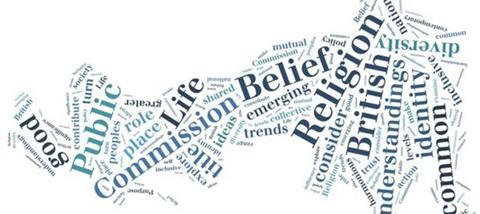
David Robertson's punchy and provocative blog left me with mixed feelings. I agree with pretty much every positive statement he makes. And yet I'm one of the Commissioners behind the report he is critiquing – the report whose approach he thinks may be a '"Trojan Horse" for the "Human Rights" religion of the metro-elites.'
Let me explain where I agree with David, and why I think he - and all evangelical Christians - should welcome the report.
I agree with David… that a 'vague inter faith potage' is a dangerous thing.
There are deep and fundamental differences between the religions and beliefs in Britain today. This is precisely why, as a Commissioner, I agreed that we should recommend an end to the requirement for collective worship in non-faith schools.
Like many other denominations, my own one is very careful not to allow its ministers to engage in 'inter-faith worship.' Different faiths can live together, and can reflect together, but Christian worship is Christian worship, and must never become syncretistic. In a society where 50% of people now have no religion, and where many schools will have pupils from a number of different faiths, it is not appropriate to demand Christian worship in non-faith schools. Indeed, there is a real danger that if schools are forced to hold collective worship, what will emerge is something which reinforces that 'all religions are basically the same'. They are not!
By contrast, we commend reflection which all children can engage in, and which doesn't pretend to be worship. We also say that 'Governments should expect publicly funded schools to be open for the provision of religion- or belief-specific teaching and worship on the school premises outside of the timetable for those who request it and wish to participate.' So we say 'yes' to the distinctiveness of Christian worship – and a big 'NO' to an inter-faith potage.
I agree with David… that Christianity is the 'foundation on which we are built'
That’s why, at the same time as serving with the head of the British Humanist Association on this commission, I was engaged in a very public argument with him on this very subject. As I argue in The Case for Christian Humanism, the Gospel of Jesus Christ is the surest foundation for human dignity and human rights. (I’m grateful to Premier for giving me the opportunity to debate these issues with an atheist philosopher both on air and in print)
In a society where most people now don’t call themselves Christians, we need to both warn (as David does so forcefully) that atheism is a shaky foundation for these values and build a peaceful common life with those who disagree. The Commission’s report is about the second of those tasks - but some of its Christian authors are also busily engaged in the first.
I agree with David… that 'religion which is reduced to the level of a knitting group or a golf club may be harmless but it is also fundamentally useless.'
To be fair to David, he has said that he needs to take time to re-read the report 'to get all the nuances.' So let me highlight one of the key passages on this issue:
'In the 2014 House of Lords debate on religion and belief in public life, it was observed that ‘it is striking how, in a liberal democratic society such as ours, religion can easily be co-opted into an ameliorative function, looking after the victims of society but not challenging society itself’… This is not a new issue – and, as was seen in previous generations, it has been a key point of debate within and between Christian denominations in Britain.'
David’s church (The Free Church of Scotland) grows out of the Disruption, when so many Scottish Christians said 'no' to the wealthy and powerful lairds appointing their ministers. As a fellow-Scot, I remember well a photo in vestry of my childhood Kirk. Taken in the 1840s, it shows the congregation of Petty Church worshipping in the woods, because they had left the established church over this crucial issue.
The wealthy and powerful must not be allowed to co-opt and tame the Gospel. So I am happy with a report that says that 'groups need to consider the dynamics generated by funding sources very carefully so that the prospect of support from government or the private sector does not diminish their ability to speak truth to power.'
Far from promoting a wooly-minded 'secularist nirvana', we go on to warn that, 'The work of William and Catherine Booth – exposing and challenging the exploitation of workers (and in particular children) in Victorian London – is one of many examples of religion and belief disturbing and challenging the status quo. The demand to integrate must not be allowed to silence the prophetic and disturbing voices of those who challenge injustice.'
Surely a Free Church Moderator can say 'Amen!' to that?
And finally…
My final point of agreement with David is this. He says that 'It is true in one sense that Britain is no longer a Christian country.' In a country where just under 50% of the population now identifies as being of 'no religion,' Christians should be under no illusions as to the scale of the challenge. The report does the Church a great service in laying out the bald realities of numerical decline. It should be a wake-up call. If we remain in denial – if we pretend Christianity is somehow the default setting of the British people – we will miss the challenge, and the joy, of helping our neighbours to encounter Jesus Christ for themselves.


























